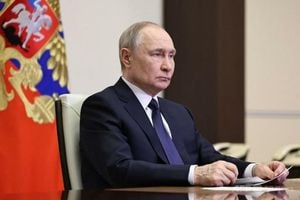In a surprising turn of events, former U.S. President Donald Trump has suggested that Ukrainian President Volodymyr Zelensky may be prepared to concede Crimea to Russia as part of a peace agreement. This statement, made during a press briefing on April 28, 2025, comes at a critical juncture in the ongoing conflict that has devastated Ukraine since Russia's invasion in February 2022.
Trump, who recently met Zelensky in the Vatican, described their encounter as "beautiful" and noted that the Ukrainian leader had requested more military aid during their brief 15-minute discussion. The meeting was significant as it marked a thaw in relations between the U.S. and Ukraine following a contentious period that included a public disagreement at the White House earlier this year.
During the April 26 meeting, Trump stated, "I think so," when asked if he believed Zelensky was willing to "give up" Crimea, a region Russia annexed in 2014. Trump emphasized that Crimea had been part of Russia for 12 years, framing the discussion within the broader context of potential U.S. peace proposals that might include recognizing Russian control over the peninsula.
As the U.S. government navigates its role as a mediator in the conflict, the White House has indicated that it could withdraw from its broker position if rapid progress is not made. Trump has reportedly given the process a two-week timeframe, urging both sides to reach an agreement. He has also called on Russian President Vladimir Putin to "stop shooting" and finalize a ceasefire deal, stressing that the time for negotiations is now.
However, not everyone is on board with the idea of conceding Crimea. German Defense Minister Boris Pistorius has publicly cautioned that Ukraine should not agree to all terms proposed by Trump’s administration. He stated, "Ukraine knows that a ceasefire or a lasting and credible peace agreement may involve territorial concessions, but these will certainly not go as far as the latest proposal from the U.S. president." This reflects a broader sentiment among European allies who are concerned about the implications of any territorial concessions.
The backdrop of these negotiations is fraught with tension. Just days after the Vatican talks, Russia launched a large-scale aerial offensive, shooting down 115 Ukrainian drones in a single night. This military action resulted in civilian casualties in the Bryansk region, further complicating the fragile atmosphere surrounding peace discussions. Both sides have accused each other of escalating the conflict, with Russia claiming that Ukraine is targeting sensitive military and civilian infrastructure.
Adding another layer to this complex geopolitical situation, North Korea has confirmed the deployment of troops to Russian territory, marking a significant development in the regional dynamics. This military collaboration could influence U.S. strategies and complicate the peace process, as Washington assesses the implications of North Korea's involvement alongside Russia.
While Trump expresses optimism about the possibility of a peace agreement, the price of such an accord could be steep. Ceding Crimea would represent a significant shift in European borders, potentially setting a dangerous precedent for future territorial disputes. This concern resonates not only within Ukraine but also among Western democracies that champion the principle of territorial integrity.
As the diplomatic landscape evolves, the coming week is being labeled as crucial for peace efforts. U.S. Secretary of State Marco Rubio has echoed this sentiment, stating, "We're close, but we're not close enough" to a deal to halt the fighting. His remarks suggest that while there is movement toward negotiations, substantial hurdles remain.
The conflict, which has already claimed tens of thousands of lives and displaced millions, continues to cast a long shadow over the region. With Russia controlling approximately 20% of Ukrainian territory, including Crimea, the stakes for both sides are incredibly high. Ukraine's military has vowed to maintain its presence on Russian-occupied territories, indicating a reluctance to concede any ground.
In the midst of these developments, the international community remains divided on how best to approach the situation. While some countries support a more aggressive stance against Russian aggression, others advocate for a diplomatic solution that may require difficult compromises.
The road ahead is uncertain, and as Trump pushes for a rapid resolution, both Ukraine and Russia must navigate their own internal pressures and international expectations. The next steps in this ongoing saga will likely shape not only the future of Ukraine but also the broader geopolitical landscape for years to come.
As the world watches, the outcome of these negotiations could redefine the principles of sovereignty and territorial integrity that have governed international relations since the end of World War II.





